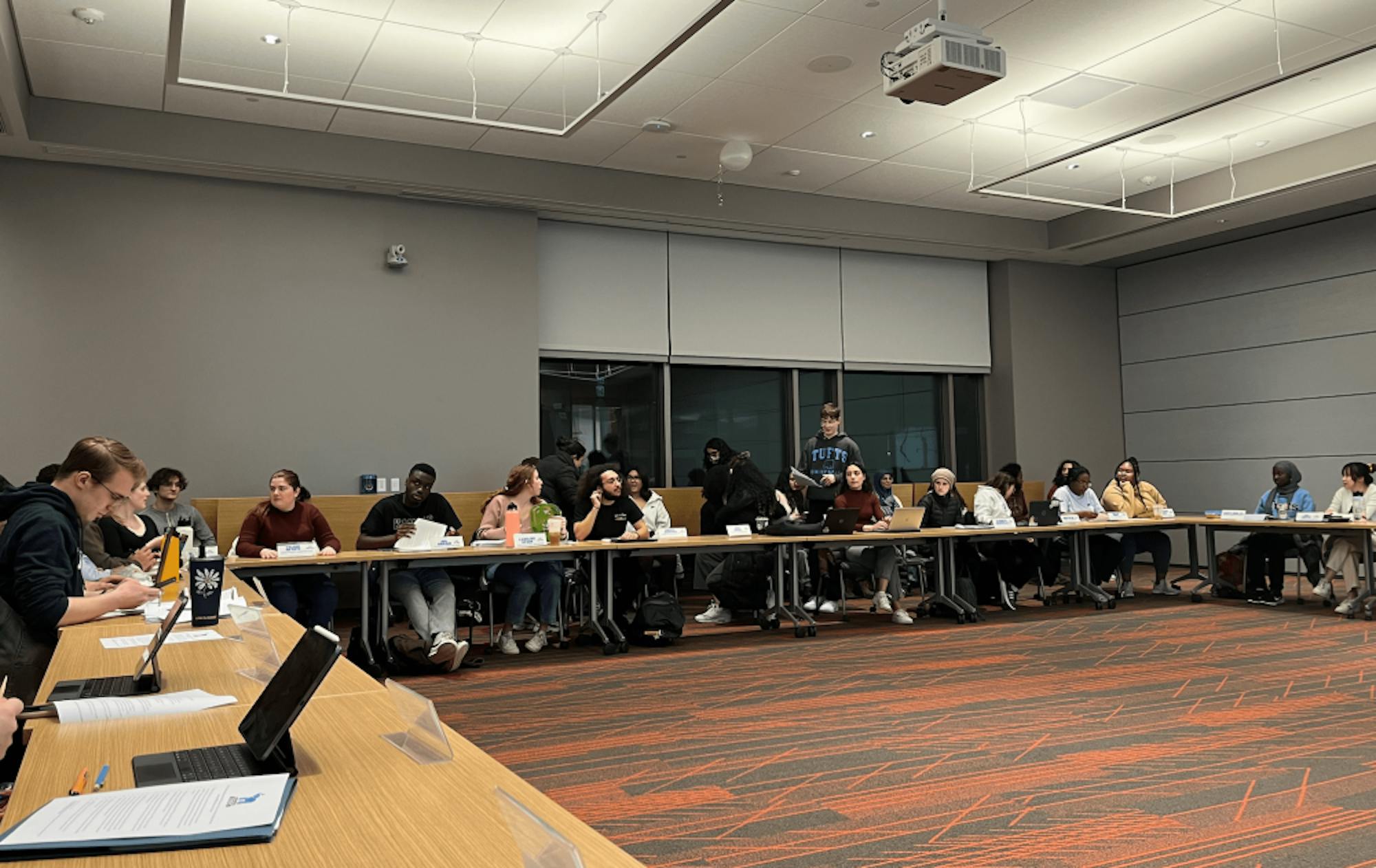The TCU Senate approved a resolution at their weekly meeting on March 5 calling on Tufts to create a center for Southwest Asian and North African (SWANA) students and a resolution calling on Tufts professors to heighten transparency of course costs on all SIS course pages. At the same meeting, senators introduced a full-text resolution calling on the university to commit to institutional climate justice, created a new subcommittee focused on sexual assault prevention and approved eight supplementary funding requests.
Sedrah Mashhour and Omayma Dalal, co-presidents of the Tufts Arab Student Association and coauthors of the SWANA center resolution, spoke in favor of creating a center on campus for SWANA students. Roughly 35 students stood at the back of the meeting in support of the resolution.
“SWANA students come from a diverse range of ethnicities and backgrounds, but they all share a common experience of navigating a world that often misunderstands and erases their identities,” Mashhour, a senior, said. “It is crucial to acknowledge the obstacles and the prejudices that SWANA individuals face in America on a day-to-day basis, and work towards combating these challenges.”
Under official census guidelines, the U.S. government categorizes all Middle Eastern and North African (MENA) individuals as white. Tufts University, which says it is “mandated to report to the federal government certain aggregate statistics about students, faculty and staff,” does not provide a unique option for MENA or SWANA racial identities when collecting data through admissions.
“One of the main reasons why we need a center tailored to SWANA students is that being considered white has led us to become an invisible minority,” Dalal, a senior, said. “This means that we experience marginalization but our experiences are often overlooked and dismissed because on paper, we’re considered white. … Creating a center and space for SWANA students would provide a much-needed support system and community where we can feel seen, heard and valued.”
After roughly 40 minutes of discussion, the senate unanimously passed the resolution with only minor adjustments to content and wording. The resolution officially requests a response from Provost Caroline Genco and Vice Provost Monroe France within two weeks.
The Senate also voted on a resolution calling on Tufts professors to “heighten transparency of course material costs” on all SIS course pages. Co-authored by TCU Senators Donovan Sanders, Tolulope Adewumi and Arielle Galinsky, the resolution calls for “estimated course cost indicators [to be] published on SIS prior to the date of enrollment” for the following semester.
“Personally, coming to Tufts, I was blindsided by the amount of required English books, textbooks and access codes and I had to struggle to find inexpensive ways to access these resources,” Adewumi, speaking on Sanders’ behalf, said. “I truly believe knowing roughly how much each course costs would have made my decision a bit more informed.”
Their resolution cites a survey conducted by the TCU Senate Education Committee in 2019 that found most students pay between $200–$400 for textbooks every semester.
“As a senate body, we’ve been working towards many initiatives that have sought to decrease the amount of obstacles facing students on an everyday basis during class,” Galinsky said. “I think one of the major obstacles in terms of academic course load is … course costs and all the hidden fees associated with classes.”
After less than 20 minutes of deliberation, the senate passed the resolution, officially requesting a response from the Tufts University Faculty Senate and Misha Eliasziw, the education affairs and policy committee chair, within two weeks.
Outreach Committee Chair Joel Omolade presented a new subcommittee named REVAMP, which stands for “Re-education: Ending Violence, Assault, Manipulation, through Prevention.” The subcommittee seeks to ensure student involvement in the university’s consent curriculum, especially during new student orientation.
“We want to work on accountability from [the] administration, making sure that our voices are being heard to change the sexual assault prevention landscape and climate here at Tufts,” Omolade, a senior, said.
Following discussion of all resolutions and the new subcommittee, the senate heard seven supplementary funding requests from clubs including the Japanese Culture Club, the Taiwanese Association of Students, Gaming Hub, TFL Comedy, Tufts Labor Coalition, Ethiopian Eritrean Student Association and the Muslim Student Association. TCU Senate allocated funding for all supplementary funding requests, totaling $67,951.
Nessren Ourdyl, a sophomore, was named Senator of the Week and the meeting was adjourned.






